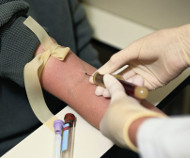1/3/2017
Idaho Supreme Court Creates Forced Blood Draw ExceptionIdaho Supreme Court says police can skip warrants in a DUI investigations when judge does not pick up his cell phone within ten minutes.

Police in Idaho no longer need a warrant to take blood forcibly from a motorist -- as long as a judge does not pick up the phone. The state Supreme Court on Friday upheld the involuntary extraction of blood from Daniel Chernobieff, who had been stopped around 11pm on September 11, 2013 for a routine traffic violation.
Idaho State Police Corporal Matthew Sly suspected Chernobieff of driving under the influence of alcohol (DUI), but Chernobieff refused all field sobriety and breath tests. So Corporal Sly dialed the on-call deputy prosecutor to ask him to obtain a judicial warrant to take Chernobieff's blood by force.
In a landmark case last June (view opinion), the US Supreme Court severely limited the use of forced blood draws, declaring them significantly more intrusive than breath tests. This built upon the 2013 McNeely decision (view opinion) in which the US Supreme Court rejected the view that there were any blanket exceptions to the need for obtaining a warrant in DUI cases. Idaho's justices found a way around the requirement: exigent circumstances.
"The proper analysis for determining if exigent circumstances exist is whether, under the totality of the circumstances of the case, the needs of law enforcement were sufficiently compelling that it was reasonable to conduct the blood draw without a warrant," Chief Justice Jim Jones wrote in the Idaho court's Friday decision.
The deputy prosecutor had spent a total of ten minutes placing calls to the duty judge's cell phone before giving up on obtaining a warrant. That was good enough for Idaho's justices, even though Ada County, with a population over 400,000, has several magistrate judges available.
"The state has an obligation to provide a functional and reliable system for obtaining warrants in circumstances like these, both during regular office hours and through the night and on weekends," Justice Jones wrote for the court. "When an on-call magistrate is unable to be reached by law enforcement, the state has the burden of showing why that is the case and that good cause exists for the unavailability."
Despite this, the high court decided the case under a standard that presumed the trial court correctly evaluated all the facts.
"Here, the state sought to present evidence as to the reason for the magistrate's unavailability, but defense counsel objected and the evidence was stricken from the record," Justice Jones concluded. "With no such evidence in the record, the court presumes that the trial court ruled correctly."
With that, the court rejected Chernobieff's attempt to suppress the blood evidence, and his conviction was upheld. A copy of the decision is available in a 150k PDF file at the source link below.


